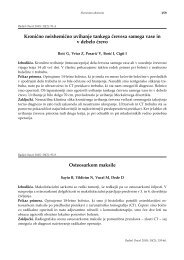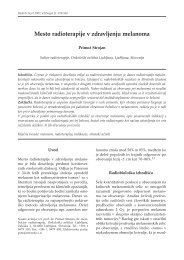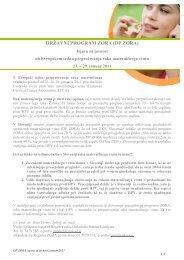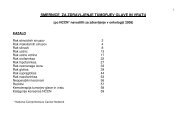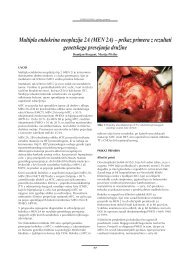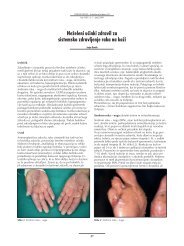You also want an ePaper? Increase the reach of your titles
YUMPU automatically turns print PDFs into web optimized ePapers that Google loves.
Proteases in cancer: progression or protection?<br />
Angela Moncada Pazos, Ana Gutiérrez Fernández, Guillermo Mariño, Cristina G. Viloria,<br />
Santiago Cal, Carlos López Otín<br />
Dept. <strong>of</strong> Biochemistry and Molecular Biology, Medical Faculty, University Institute <strong>of</strong> Oncology,<br />
University <strong>of</strong> Oviedo, Spain<br />
Proteolytic enzymes have long been associated with cancer progression because <strong>of</strong> their<br />
ability to degrade extracellular matrix components, which facilitates tumour invasion and<br />
metastasis. These facts provided the rationale for clinical trials with protease inhibitors,<br />
which, unfortunately, have not been positive in most cases. Recent studies have revealed<br />
how proteases contribute with both pro-tumour and anti-tumour activities in all tumourprogression<br />
stages, what has forced a re-evaluation <strong>of</strong> the prevailing concepts in this field.<br />
To date, more than 30 proteolytic enzymes belong to the growing group <strong>of</strong> anti-tumour<br />
proteases which mainly includes different caspases, deubiquitylases, kallikreins, and<br />
members <strong>of</strong> the MMP and ADAMTS families.<br />
We have recently described several intracellular and extracellular proteases with antitumour<br />
properties. Thus, autophagin 3 (Atg4c) is an intracellular cysteine protease<br />
involved in processing events associated with autophagy. Mice lacking autophagin-3 show<br />
a high incidence <strong>of</strong> carcinogen-induced fibrosarcomas, which has been correlated with<br />
the decrease in autophagy found in Atg4c -/- fibroblasts. Among extracelullar proteases, we<br />
have previously described that MMP-8 reduces skin tumour susceptibility by modulating<br />
inflammatory response to chemical carcinogens. We have recently extended these results<br />
with the finding that MMP-8 expression in mice also prevents metastasis by reducing<br />
invasion capability and altering cellular adhesion. Moreover, MMP-8 levels in human<br />
breast cancer are associated with good clinical prognosis, reinforcing the idea <strong>of</strong> the<br />
protective role <strong>of</strong> this enzyme. Parallel studies on different members <strong>of</strong> the ADAMTS<br />
family have allowed us to propose novel tumour-defying functions for ADAMTS-12<br />
and ADAMTS-15. Thus, ADAMTS-12 controls tumour progression by modulation <strong>of</strong><br />
the Ras-dependent ERK signalling pathway. Further work has revealed that this gene is<br />
l23<br />
epigenetically silenced in colon carcinomas, suggesting that this mechanism may operate<br />
in vivo to inactivate the tumour-suppressor actions <strong>of</strong> this metalloproteinase. Finally,<br />
mutational analysis <strong>of</strong> different proteases presumably associated with cancer has shown<br />
that ADAMTS-15 is inactivated by mutation but not by epigenetic silencing, in several<br />
carcinomas. On the basis <strong>of</strong> these results, we can conclude that tumour protective roles<br />
<strong>of</strong> proteases are much more relevant than originally anticipated, thereby contributing to<br />
expand the functional complexity <strong>of</strong> the cancer degradome, which is the complete set <strong>of</strong><br />
proteases produced by a malignant tumour.<br />
38




